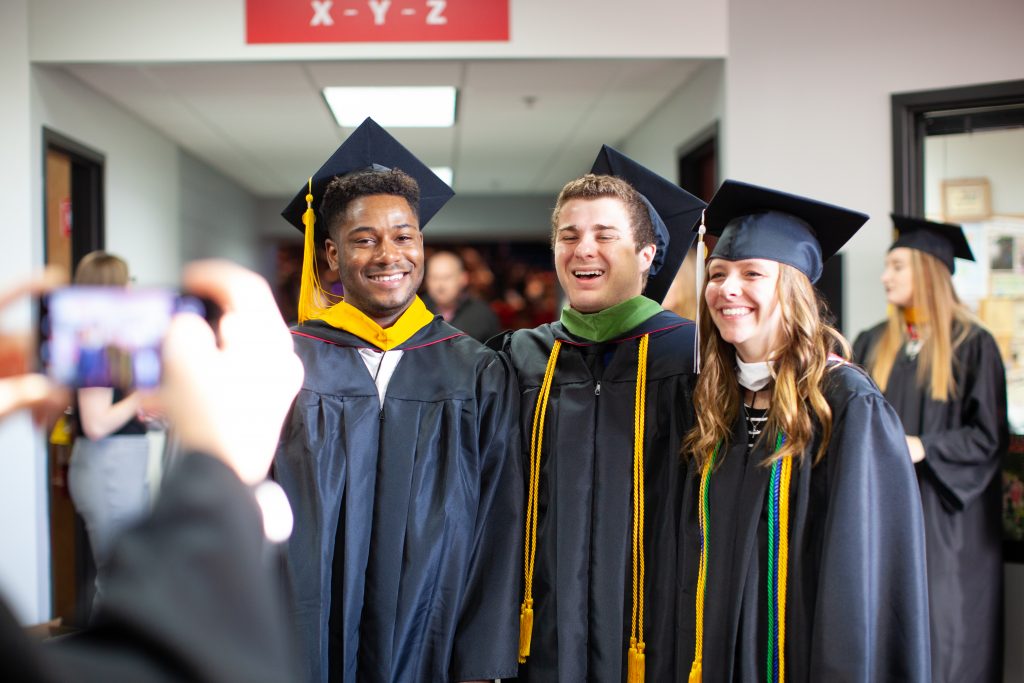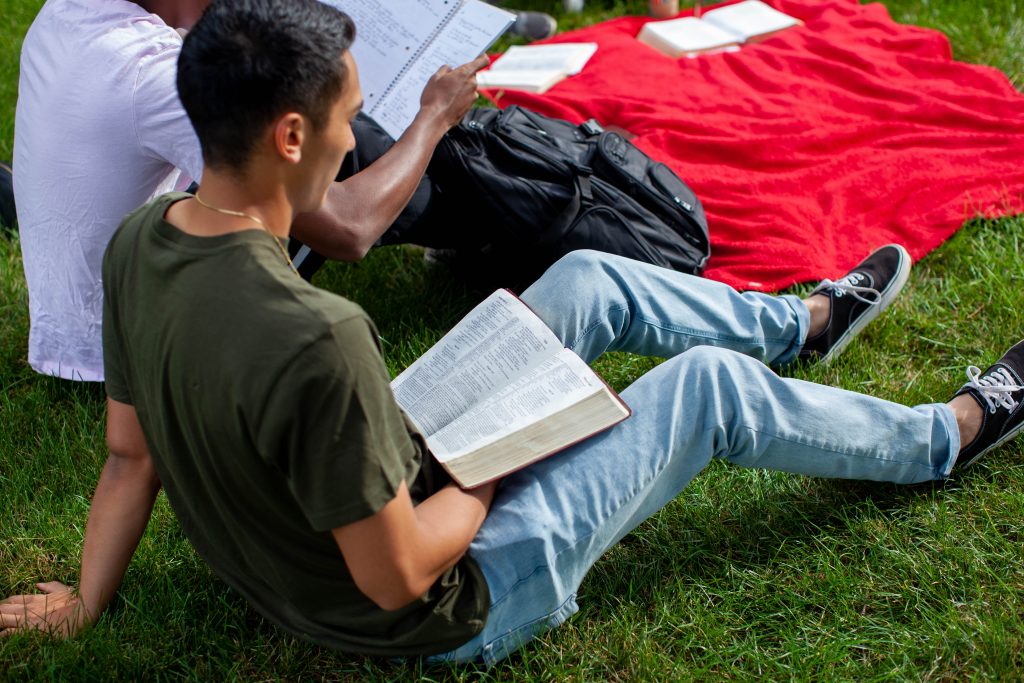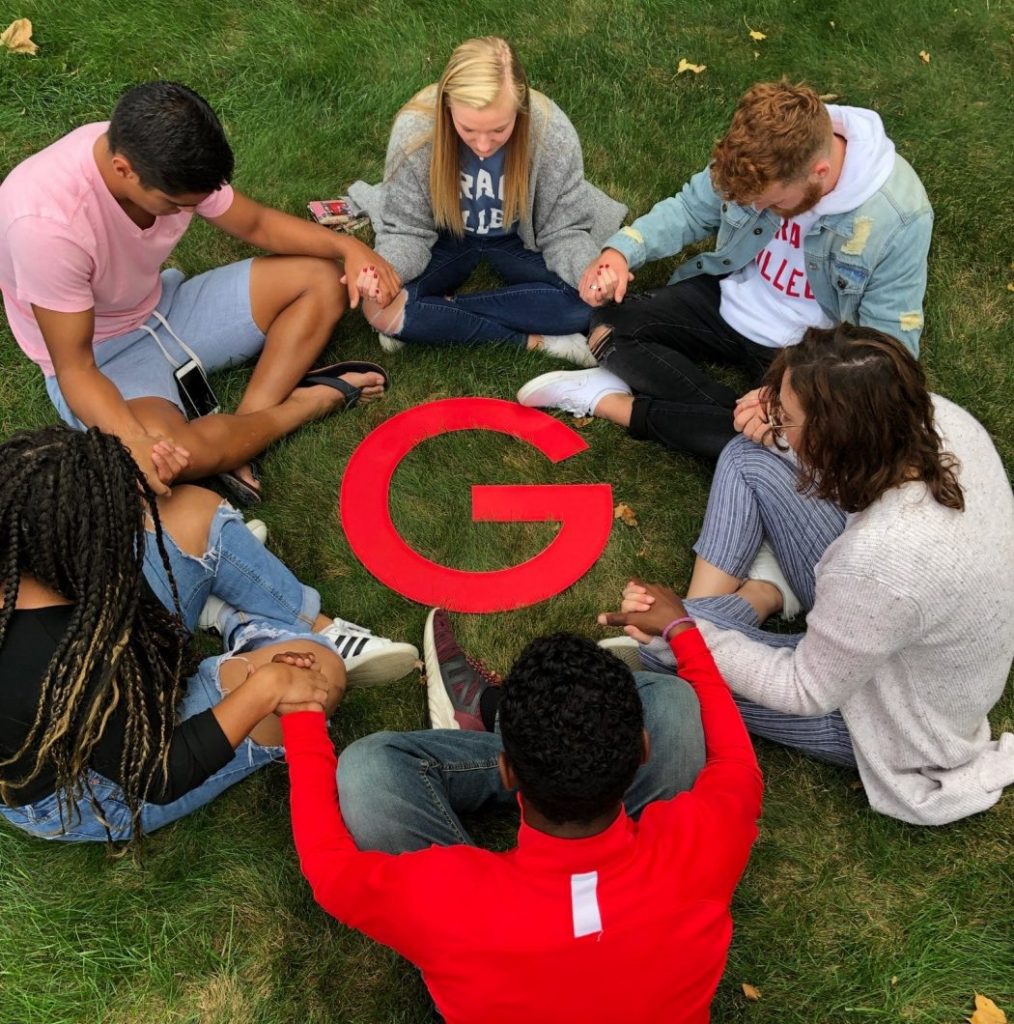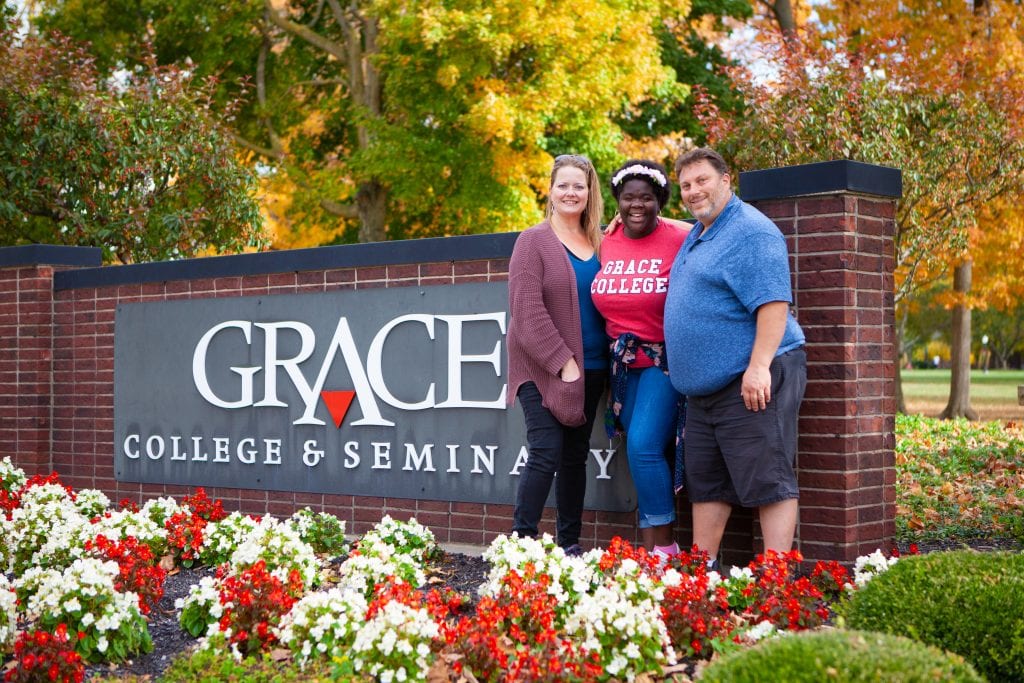
The True Cost of College Education

At Grace College, we think the financial cost of college education is important, so we are continually investing in innovative new ways to make higher education affordable. But, the true cost of college education isn’t always preceded by a dollar sign – sometimes it’s preceded by a cross. As a faith-based institution, we believe Grace has a higher calling than simply educating students. We want students to know Christ and to make Him known.
The following article is a study about the value of faith-based education.
When a Christian Teen Attends a Non-Christian College
By: Steve Henderson, President of Christian Consulting for Colleges and Ministries
Research suggests that college choice has an impact on religious commitment.
Right now, hundreds of thousands of Christian young people are in the process of making one of the most important choices of their lives—where to attend college.
This is not the most important choice they will ever make. That distinction belongs to the choice of accepting Jesus Christ as personal savior. Other important choices include the choice of a spouse and the choice of a career.
While each of these choices is distinct, they are not unrelated. Most of us fail to appreciate the extent to which the choice of a college relates to these other important life choices. The literature and the research (as well as the experiences of many) suggest a strong link between a young person’s choice of a college and their short-term and long-term commitment to Christian faith.
The Price Versus the Cost of College Education
For those who are dedicated to recruiting young people for Christian colleges and universities, one common response causes much frustration: “We just can’t afford a Christian college.”
The truth is the cost of college education comes with a significant price tag no matter where you go. The cost of college education at a Christian institution may be higher than some other institutions, especially public institutions, as state subsidies for public education can be difficult to match. However, my typical response to this question is to ask another question. “Is the lower price tag worth the potential cost of college education?”
Unfortunately, I know about the cost of college education. Some pain still lingers from seeing one of my own children self-destruct. I remember how proud I was to see my dynamic, scholarship-winning, powerfully Christian daughter move in as a freshman at a well-respected public institution.
I also recall the shock and grief that came not long after when I learned that drugs and alcohol had become so much a part of her lifestyle that they were putting her in grave danger.
The choices my daughter made brought over a decade of grief to our family. Thankfully, after many years of prayer, counsel, and encouragement, my daughter is being restored. In fact, she is now an incredible and successful woman. She gave me permission to cite her story with the hope of helping other families avoid the pain that we experienced.
The painful memories have inspired me to dedicate much of my life to studying the impact of college choice on religious commitment. It is not my intention to “scare” anyone into making the choice for a Christian school. Neither do I contend that a Christian college or university is always the best choice for a family, as every child, every parent, and each situation are unique.
I also don’t dismiss the argument that Christian young people have the opportunity to become salt and light at non-Christian colleges. However, research shows that most students are unprepared for the conflict of worldviews they will encounter at non-Christian colleges and universities. Dropping a beautiful diamond into the mud won’t purify that environment. Rather it may dirty the gem until it is unrecognizable.

Pivotal Years
Numerous authors point to the significant transition that takes place in the college years. Teenagers enter this time still children in many ways. They leave as adults. They shift from parental control and dependence to self-control and more self-reliance. In addition, the college years are a time when core values from childhood are tested, sorted, and prioritized in ways that often will last a lifetime. This is also a time when people move from an imposed faith to an owned faith, one that is a foundation for their entire life structure.
Noted student development authority Art Chickering (as well as Ernest Pascarella and Patrick Terenzini, in their classic How College Affects Students) is among those who point to the college years as one of the most significant times in a student’s “search for identity.” This is a time that greatly shapes the adult he or she will become. What happens if this major metamorphosis takes place in a non-supportive environment (at best) or a hostile one (at worst)? The results of nearly 25 years of research consistently reveal that those who do not attend a Christ-centered college will experience a decline in religious values, attitudes, and behaviors during college.
Despite some exceptions, the research clearly establishes that enrollment in selective, prestigious, non-religiously affiliated colleges (i.e., typical secular private colleges) or public colleges and universities correlates with significant decreases in religious affiliation and behavior, such as church attendance, praying, reading the Bible, and discussing religion. On the other hand, enrollment in church-related colleges of all types tends to support and strengthen the student’s existing religious values and behaviors.
Leaving Faith Behind
A few years ago, George Fox University professor Gary Railsback, a fellow researcher, prepared an interesting study. Using his data, I determined that more than 52 percent of incoming freshmen who identify themselves as born-again upon entering a public university will either no longer identify themselves as born-again four years later or, even if they do still claim that identification, will not have attended any religious service in over a year.
This means over half of our kids are reporting a rejection of their religious values if they attend a public university.
This pattern of rejection was similar at secular private colleges and much worse (63 percent) at Catholic colleges. Newer data show a similar rejection pattern across all types of institutions, except for students attending a purposefully Christian college. If the past is a fair indication of the future, at least half and possibly over two-thirds of our kids will step away from their faith while attending non-Christian colleges and universities.
A recent press release on the ongoing National Study of College Students’ Search for Meaning and Purpose offered some interesting information on students who are beginning their college years. While 79 percent of all freshmen believe in God, 69 percent pray, and 81 percent attend religious services at least occasionally, 57 percent question their religious beliefs, 52 percent disagree with their parents about religious matters and 65 percent feel distant from God. College students are asking deep questions about their faith. Unless they are at a Christian college, they may find themselves in an environment that is not conducive to providing supportive answers.

Quantifying the Cost of College Education
Both my own study and Railsback’s conclude that there are significant differences in religious commitment depending on the type or affiliation of the college attended. For my study, I examined the responses of nearly 16,000 students attending 133 different institutions. All students were measured as freshmen and then again at least three years later using a comparable survey instrument in cooperation with the Higher Education Research Institute of the University of California at Los Angeles (UCLA). The findings of my study, although more specific than earlier studies, are generally consistent with prior research. In preparing this research, I reviewed over 1,000 articles, books, and studies. Although, as previously stated, there are exceptions to these trends, it is clear that the choice of a college does impact students’ religious commitment. Here are the main findings:
- The affiliation of the college attended does appear to be related to the student’s overall change in religious commitment as well as to the students’ adherence to the incoming religious preference. In other words, there is a correlation between the type of college students choose and what happens to their religious commitment during the college years. There is also a relationship between the type of college attended and whether the student continues in his or her family’s religious tradition.
- Students who choose to attend a non-affiliated independent institution (secular private), state, Presbyterian, and Catholic affiliated institutions appear to experience the largest declines in overall religious commitment. These institutions are listed in order of decline in religious commitment from the largest overall decline. Students who attend private, non-religious institutions show larger drops in religious commitment than any other type of college, even public institutions. This bears out the reality that, though most renowned secular private universities started with a religious commitment, many have become nearly antagonistic to faith.
- Students who attend independent Protestant, Baptist and other Protestant affiliated institutions report the largest increases in overall religious commitment. These, again, are listed order of increases in religious commitment from the largest overall increase.
Students who attend these kinds of institutions consistently report increases in all measures of religious commitment.
This increase in religious commitment stands out especially when compared to the major decreases at secular private and public colleges. Those attending public versus independent-Protestant institutions, for example, experience nearly four times the drop in church attendance and fifteen times the drop in overall spirituality.
- Students who attend institutions that are members of the Council for Christian Colleges and Universities (CCCU), when compared to those who attended non-member institutions, showed significant positive differences on almost all individual measures of religious commitment, as well as an overall increase in that commitment.
Attending a CCCU school is clearly correlated to increases in nearly all measures of religious commitment. Member institutions are set apart from others by their adherence to Christian principles, broader liberal arts programs, and commitment to hiring only believers as full-time faculty and administrators. Students who attend these institutions are often exposed to chapels and other worship experiences that reinforce these values. They also learn from (and are mentored by) faculty who exemplify these principles. Perhaps most important for students in this time of transition is that they attend, live, worship, and communicate with fellow students who endorse these same values. The differences in choosing a CCCU school versus a non-CCCU school are dramatic: one-fourth the drop in church attendance, one-seventh the drop in prayer and meditation, and nearly five times the increase in overall religious commitment.
- A drop-in religious service attendance was by far the greatest negative change for the population studied. There is a decrease in attendance of religious services across all students attending all types of colleges. Shifting from a possible parental expectation of attending all services and youth group meetings to a freedom of choice does offer an opportunity for students to shift to schedules more of their liking. However, the specifics are instructive. The smallest drop is for students attending Baptist institutions (followed by independent-Protestant colleges) and is comparable to the small drop at CCCU schools.
Most authors agree that this one variable, church attendance, is the most important factor for measuring and predicting the current and long-term religious commitment of people of all ages.
- In many cases, the more conservative the student’s denominational background, the greater the change at no-affiliation private (secular) and public institutions. Comparatively speaking, the degree of change is most pronounced among students from a more conservative background who attend a public or a secular private institution. To put it another way, students from more conservative backgrounds change more than those from less-conservative denominations when confronted with the challenges of these institutions.
Most of the change in students’ attitudes and behaviors takes place during the first year away from home. As discussed by Alyssa Bryant in an article in the Journal of College Student Development, students become significantly less religiously active during the first year of college. That this is the case should come as no surprise, as students, for the first time in their lives, are no longer under their parents’ control and influence.
This is also a time for students to begin thinking more on their own and for building a foundation for their life’s direction.
Thus, being in an environment that includes both peer and faculty support for good decisions, in the first year of college especially, is one of the greatest benefits of attending a Christian college. In contrast, being in an environment wherein both peers and faculty are critical of if not hostile to Christian values and morals can make this first year a very difficult time for a struggling freshman.
The results of the research have led me to make several recommendations primarily to students and parents who are together considering lower-priced alternatives to the cost of college education for conservative colleges. I also have recommendations for pastors and other religious leaders.

“Train Up a Child”
I believe and support the Scripture “Train up a child in the way he should go and when he is old, he will not depart from it” (Prov. 22:6 KJV). Two quick observations are appropriate. First, notice that the word is “should,” not “would” or “could.” The natural self-will of a child is often contrary to the will of the parent.
On matters of lifelong importance, parents need to make sure that right choices are made. They should not abdicate this training/leadership role to a willful child. Second, perhaps we have, albeit unintentionally, put a time limit on the word “train.” It is clear that people in the era when this passage was written considered children of any age to be under parental authority until they had established their own families and careers. Perhaps we have come to the erroneous conclusion that our parental training responsibility is finished at high school graduation, especially for those who have invested in Christian high school education or homeschooling. Most of us would agree that the vast majority of 17-year-olds are not quite ready to start their own lives without some parental input and control.
We need to understand the lifetime impact of good early training in light of the research. Not only do students normally reflect the values of the college professors of their senior year, but they also tend to reflect these same values 25 years later. Perhaps we have too early acquiesced—given in by passivity—our responsibility for the training of children. Young people’s search for identity is going to happen for our kids during these college years. However, students are using this time for exploration and experimentation that is often unhealthy and unholy. In Tom Wolfe’s book, I am Charlotte Simmons, Charlotte’s best friend expresses:
“I guess what I really mean is college is like this four-year period you have when you can try anything—everything—and if it goes wrong, there’s no consequences. You know what I mean? Nobody’s keeping score! You can do things that if you tried them before you got to college, your family would be crying and pulling their hair out and giving you these now-see-what-you’ve-gone-and-done looks? …. College is the only time in your life, or your adult life anyway, when you can really experiment, and at a certain point, when you graduate or whatever, everybody’s memory like evaporates.”
This vital, pivotal time of exploration is best negotiated in a structured, value-based setting that has the potential for safeguards and correction, not just accommodation.
Let us not underestimate the magnitude of the problem. Of the approximately 400,000 high school seniors each year who would meet the admissions criteria for a CCCU college, only 15 percent (approximately 65,000) are attending any type of Christian college. If we lose them at only the 52 percent public university drop rate (remember that others have a higher rate) for all students who go to non-Christian colleges, that means that at least 177,000 young people have moved away from the faith. Strengthening the faith of the 65,000 who attend Christian colleges is commendable, but having three times that many fall away is horrendous.

Concluding Thoughts on the Cost of College Education
What we are facing is nothing new. This morphing of students’ family values has been happening for centuries. The Babylonians understood this and implemented an interesting public educational agenda. The best and the brightest Jewish children were selected for education in the art, history, and language of the Chaldeans for a time period equivalent to a four-year cost of college education. The agenda was clear: change the students’ location (separate from the family roots), change the support group (remove from family, friends and church), change their names (all were given non-Jewish names), and change their lifestyle (things that were detestable and unclean according to family tradition were forced on them).
It is not hard to notice similarities to the Babylonian educational agenda within our public higher education system. Young people identify with a fraternity or sorority instead of a church. They dabble in many things that would not be allowed in our homes, and the list could go on.
We don’t know how many young people were drafted into the Babylonian educational environment, but we know of only four who stood, and only one by his given name, Daniel. All the others who bowed to that system lost their future, their past, their purity, their heritage, and most likely their God. Even our heroes who stood probably bore the pain and scars of emasculation, a common occurrence for those who were put under the care of the court officials and eunuchs.
What marks and scars will our children bear even if they make it through our public or secular education system? Which of our young students will bend and bow to the world’s system if they have to make that choice? Over half are doing it now.
From Genesis through Revelation, there are countless warnings regarding the results of acquiescing to the world’s system. Most likely, the Babylonian captivity was the direct result of the complacency of the parents for generations not standing firm on their Scriptural religious values. We must not let future generations label us as complacent about something so important as the long-term spiritual lives of our children. Help them prepare for the college environment wherever they go, and, perhaps most importantly, help them choose wisely. The lower price may not be worth the cost of college education.
Dr. Steve Henderson is the founder and President of Christian Consulting for Colleges and Ministries. His ongoing national study on what happens to Christian kids if they attend non-Christian colleges has been a widely quoted source for promoting the cost of college education and value of Christian college education. In this article, Henderson presents his studies on the relationship between college affiliation and religious commitment in conjunction with the Higher Education Research Institute of the University of California at Los Angeles.
This article first appeared on ChristianCollegeGuide.net.
It is used by permission of ChristianCollegeGuide.net and Christianity Today, Carol Stream, IL 60188.
Previous Post

